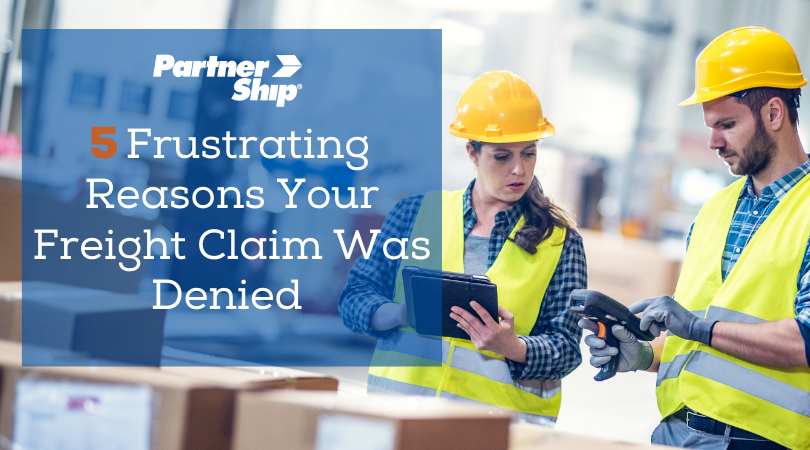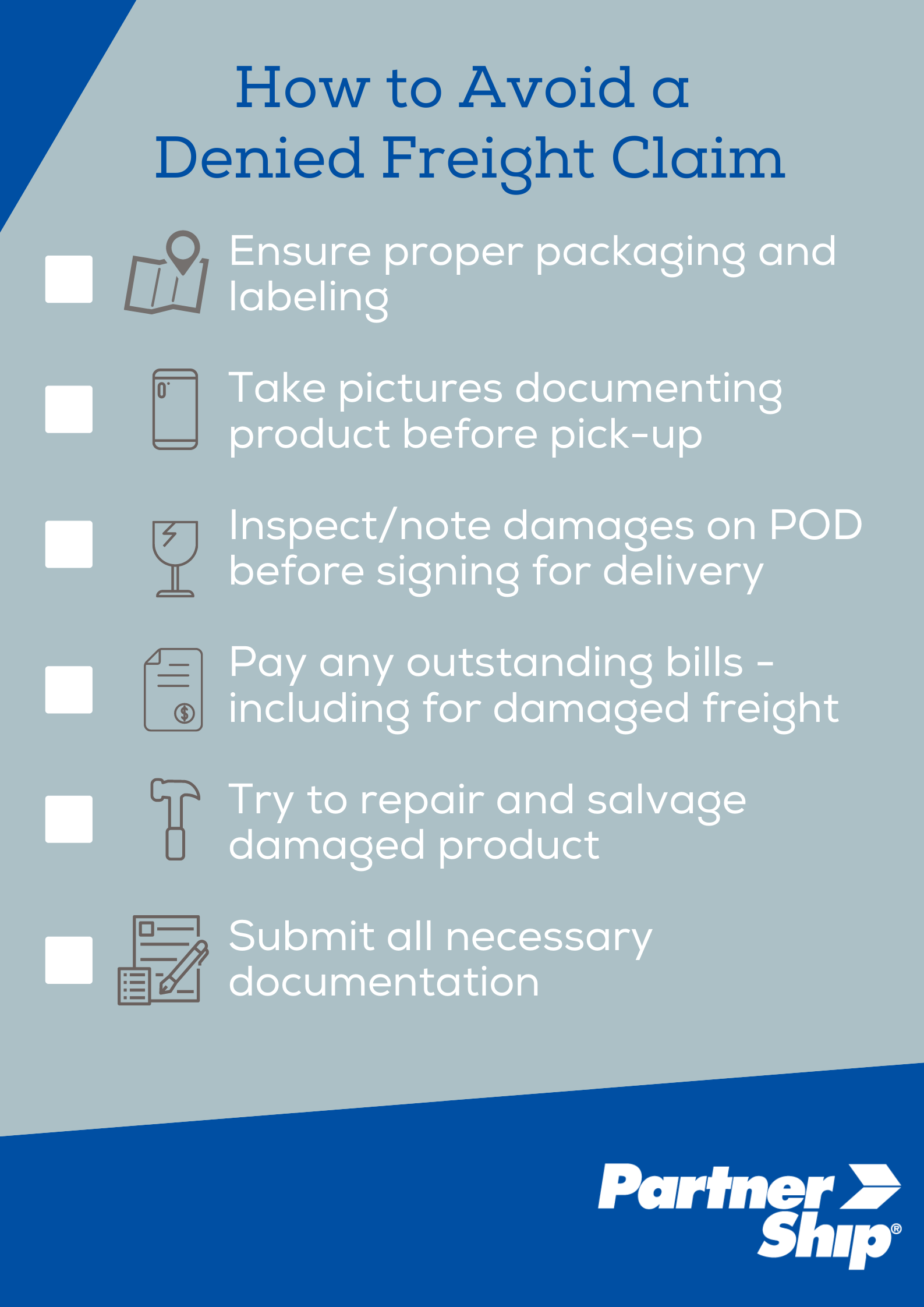5 Frustrating Reasons Your Freight Claim Was Denied
07/16/2025 — Jen Deming

While we’d like to think that freight loss and damage can be avoided, realistically it’s something every shipper will face. That means that at some point you will likely need to file the dreaded freight claim. Unfortunately, when it comes to the final say in payouts, carriers are in the driver’s seat. The good news is, most denied claims or insufficient payouts are caused by five common oversights. If you can avoid these issues, you are more likely to win your claim and recoup your losses.
- It falls into one of the exclusions outline by the Carmack Amendment
The Carmack Amendment was passed in 1935 in order to protect carriers from exclusive responsibility for any damage or loss occurring during transit. It sets up five scenarios that legally exclude the carrier from liability. If damage or loss occurs due to one of these instances, it’s unlikely you’ll be able to collect for the damages.
Act of God – Unavoidable events such as natural disasters, adverse weather conditions, medical emergencies, etc. that may befall the driver during transit fall into this category. These events have to be determined as unforeseeable and inevitable in order for the carrier to remain free from responsibility.
Public Enemy – If the damage-causing incident occurred during a defensive call to action by the government or “military force”, the carrier is not responsible for damages. While rare during peacetime, this scenario has also been applied to acts of domestic terrorism, but does not refer to hijackers, cargo theft, etc.
Default of Shipper – This scenario is the most common exclusion and places full responsibility for damages squarely on the shipper. If damage is caused by negligence of the shipper, due to poor packaging, improper labeling, rough handling during loading, and other factors, the carrier is exempt from liability.
Public Authority – An incident that results in damage or delay due to government intervention like road closures, quarantines, trade embargoes, etc. are unavoidable and exempt carriers from responsibility.
Inherent Vice – Some high-risk commodities deteriorate naturally over time, such as live plants, food, medical supplies, etc. As long as that deterioration is not being sped up by the carrier through negligence, they are safe from liability.
- You are missing key documentation
When you are submitting a claim, it is important that you have every piece of paperwork filled out correctly and in proper order for the carrier to review. The more documentation you can provide about specifics relating to your load, the better chance you have at winning a claim. It’s important for you to prove that the shipment was in good condition and securely packaged at the time of pick-up. Taking pictures of the product before, during, and after packaging is completed is a smart move.
You should also make sure that the bill-of-lading (BOL) is filled out correctly with precise weight measurements, commodity descriptions, classifications, and piece counts. The BOL serves as a legal contract between the carrier and shipper – errors on this document will have far-reaching consequences. If your weight is off or the commodity/classification is incorrect, liability payouts may be less than you expect.
An invoice determining the actual value of your product is key in determining a payout, as well as packing slips that help back up your piece counts. Other supporting documents like the paid freight bill, inspection reports, weight certificates, replacement and repair invoices, etc., are all great things to keep on hand in the event of a claim.
In addition to obtaining as many pieces of documentation as possible to support your claim, it’s key to present everything to the carrier in a timely manner. You have up to nine months from the delivery date to submit a damage claim. For lost shipments, you have up to 9 months to file from the date it was estimated to arrive. Concealed damage claims are much more urgent – a claim must be filed within five days. So after receiving your delivery, be sure to unpack your shipments and check for hidden damage as soon as possible.
- You didn't attempt to mitigate the damages
Even if the carrier takes responsibility for the damages caused to your freight, they are going to fight to pay the least amount possible. It is important to show that you have attempted to mitigate and lessen the effect of these damages as much as possible. Carriers are likely to want to know whether you attempted to salvage the shipment. Were you able to have the broken or missing items repaired or sold at a discount, if possible? It’s important that the proper commodity, nature of the damage, replacement costs, and potential loss of business are accurately represented to determine the full extent of loss.
The carrier has the right to inspect the damaged shipment as part of the freight claims process. So, it is very important not to dispose of damaged freight, unless storing it poses a threat to safety or health, such as with hazardous materials or spoiled food items. If this is the case, the carrier must be notified as soon as possible so they can act on inspecting the freight if need be. Preventing them from the opportunity to do so can result in an immediate denied claim.
- You haven't paid your freight bill
The last thing you might want to do is to pay a carrier for a shipment that they damaged during transit. However, it is important to be current on your invoices if you are submitting a freight claim. If you owe the carrier in freight charges, either for past due invoices or for the damaged load, you’re likely to get denied for a payout. Even if you do get approved, the reimbursement process may be drawn out or even amended to a much lower amount due to the total charges you owe the shipper.
The most important thing to note is that accidents and damages happen, despite the best of intentions. Paying your freight bill on time, even if a damage claim will be submitted, is a sign of good faith and can help maintain a working business relationship with a carrier who otherwise serves your business well.
- You've signed for a clear proof of delivery
If you take one point away from this list of tips, let this be the one: remember to inspect your shipment before signing the proof of delivery (POD). This document acknowledges the arrival of the load to the point of delivery. By simply signing this document and allowing the driver to continue on his way, you are stating that it has delivered free and clear without any loss or damages.
Smart shippers note: this is your opportunity to review and inspect your shipments carefully and note any discrepancies on the POD. Open boxes and check for concealed damages or loss. This is especially important if you have multiple pallets, crates, or shrink-wrapped items. Make sure what you have matches the BOL. If your BOL shows two shrink-wrapped pallets of stacked boxes, but the total piece count is off, make sure you note those missing items. Otherwise, a carrier can claim they delivered “two pallets” as stated on the BOL.
If you are the shipper, make sure your delivery location knows the importance of these procedures. It is on them to take pictures, note discrepancies, and challenge the carrier accordingly at the point of delivery.
If you’re not prepared, it’s much more likely that your freight claim will get denied. Use the checklist below to make sure you’re in a position to get the payout you deserve.

The bottom line
Freight damage is frustrating, time-intensive, and expensive. While it’s reassuring that you can submit a claim with the carrier in order to recoup your losses, it’s important that you are thorough in the information you provide. The more you know about freight claims, the better prepared you are when going to bat against the carriers.